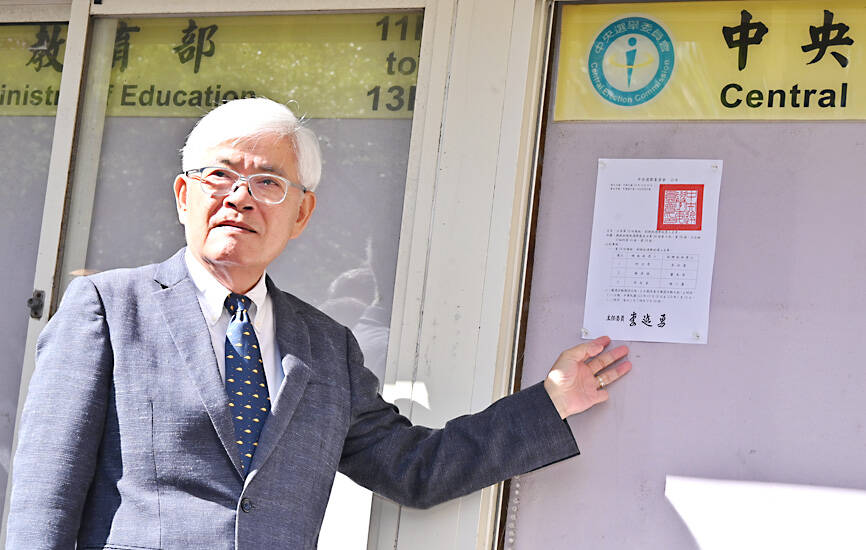The campaign for the Jan. 13 presidential and legislative elections officially starts today and is to last 28 days until Jan. 12, the Central Election Commission (CEC) said yesterday.
The hours that candidates are allowed to hold their campaign activities are from 7am to 10pm, CEC Chairman Lee Chin-yung (李進勇) told a news conference.
The order in which candidates are to be listed on the presidential ballot was also officially announced by Lee at the event, after a lottery was conducted earlier this week.

Photo: Liu Hsin-de, Taipei Times
Taiwan People’s Party Chairman and presidential candidate Ko Wen-je (柯文哲) and his running mate, Cynthia Wu (吳欣盈), secured the top position on the ballot, while Vice President William Lai (賴清德), the Democratic Progressive Party’s (DPP) presidential candidate, and former representative to the US Hsiao Bi-khim (蕭美琴) drew the second position, and New Taipei City Mayor Hou You-yi (侯友宜), the Chinese Nationalist Party’s (KMT) presidential candidate, and his running mate, Jaw Shaw-kong (趙少康), placed third.
About 19.5 million eligible voters, including about 1.03 million first-time voters, will be able to cast ballots at 17,794 polling stations around the country that are to be open from 8am to 4pm, the commission said.
Taiwan does not allow absentee ballots or early voting.
The exact number of eligible voters is to be announced on Jan. 9, CEC Vice Chairman Chen Chao-chien (陳朝建) said.
Lee urged the media to adhere to the principles of impartiality and fairness when reporting on election-related issues.
Regarding public opinion polls, Lee said such activities need to list key details, including the name of the organization conducting the survey, the time, method, numbers, margin of error and source of funding.
Starting from Jan. 3, citing, publishing, disseminating, reporting or commenting publicly on any opinion polls pertaining to the elections or the candidates would not be permitted, Lee said.
The prohibition applies to political parties, the news media, polling companies and individuals, the CEC said.

Taiwan is stepping up plans to create self-sufficient supply chains for combat drones and increase foreign orders from the US to counter China’s numerical superiority, a defense official said on Saturday. Commenting on condition of anonymity, the official said the nation’s armed forces are in agreement with US Admiral Samuel Paparo’s assessment that Taiwan’s military must be prepared to turn the nation’s waters into a “hellscape” for the Chinese People’s Liberation Army (PLA). Paparo, the commander of the US Indo-Pacific Command, reiterated the concept during a Congressional hearing in Washington on Wednesday. He first coined the term in a security conference last

Prosecutors today declined to say who was questioned regarding alleged forgery on petitions to recall Democratic Progressive Party (DPP) legislators, after Chinese-language media earlier reported that members of the Chinese Nationalist Party (KMT) Youth League were brought in for questioning. The Ministry of Justice Investigation Bureau confirmed that two people had been questioned, but did not disclose any further information about the ongoing investigation. KMT Youth League members Lee Hsiao-liang (李孝亮) and Liu Szu-yin (劉思吟) — who are leading the effort to recall DPP caucus chief executive Rosalia Wu (吳思瑤) and Legislator Wu Pei-yi (吳沛憶) — both posted on Facebook saying: “I

Sung Chien-liang (宋建樑), who led efforts to recall Democratic Progressive Party (DPP) Legislator Lee Kun-cheng (李坤城), was released on bail of NT$80,000 today amid outcry over his decision to wear a Nazi armband to questioning the night before. Sung arrived at the New Taipei District Prosecutors’ Office for questioning in a recall petition forgery case last night wearing a red armband bearing a swastika, carrying a copy of Adolf Hitler’s Mein Kampf and giving a Nazi salute. Sung left the building at 1:15am without the armband and covering the book with his coat. Lee said today that this is a serious

The Ministry of Economic Affairs has fined Taobao NT$1.2 million (US$36,912) for advertisements that exceed its approved business scope, requiring the Chinese e-commerce platform to make corrections in the first half of this year or its license may be revoked. Lawmakers have called for stricter enforcement of Chinese e-commerce platforms and measures to prevent China from laundering its goods through Taiwan in response to US President Donald Trump’s heavy tariffs on China. The Legislative Yuan’s Finance Committee met today to discuss policies to prevent China from dumping goods in Taiwan, inviting government agencies to report. Democratic Progressive Party Legislator Kuo Kuo-wen (郭國文) said